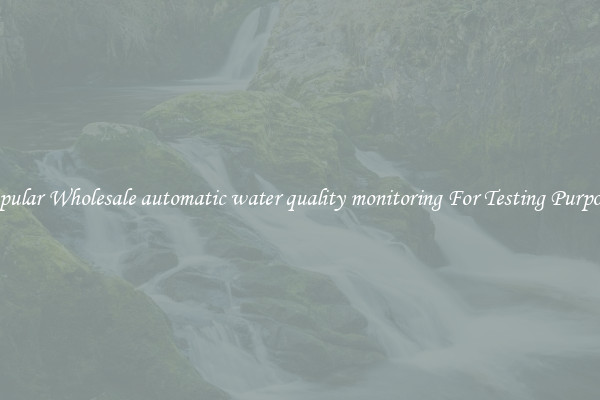Popular Wholesale automatic water quality monitoring For Testing Purposes
Water is a precious and essential resource that we rely on for various purposes, including drinking, irrigation, and industrial processes. Ensuring the quality of water is of utmost importance to prevent any harmful effects on human health and the environment. That's where automatic water quality monitoring systems come into play. These systems have gained popularity in wholesale markets due to their efficiency and reliability in testing water quality.

One of the key advantages of wholesale automatic water quality monitoring systems is their ability to continuously monitor the water quality parameters. These systems are equipped with sensors that measure various parameters such as pH levels, temperature, conductivity, turbidity, and dissolved oxygen levels. The data collected by these sensors is then transmitted to a central monitoring unit, which provides real-time information on the quality of the water being tested.
This continuous monitoring feature is particularly useful in industries and municipal water treatment facilities. By having a constant stream of data on water quality, operators can identify any anomalies or deviations from the desired standards promptly. This allows for timely action to be taken, such as adjusting the treatment process or implementing remedial measures to maintain water quality within acceptable limits.
Moreover, automatic water quality monitoring systems eliminate the need for manual sampling and laboratory testing, which can be time-consuming and costly. Traditional methods involve collecting water samples, transporting them to a laboratory, and waiting for the results. This process can take several hours or even days, leading to delays in identifying and addressing any potential water quality issues. With automatic monitoring systems, data is readily available, allowing for quick decision-making and faster response times.
Another benefit of wholesale automatic water quality monitoring systems is their versatility in testing different types of water sources. Whether it is surface water, ground water, or even wastewater, these systems can be customized to analyze the specific parameters relevant to the source. This flexibility makes them suitable for a wide range of applications, including monitoring drinking water sources, ensuring compliance with regulatory standards, and assessing the effectiveness of water treatment processes.
Furthermore, the data collected by wholesale automatic water quality monitoring systems can be analyzed and interpreted to generate comprehensive reports. These reports can provide valuable insights into the overall water quality trends and patterns, enabling users to identify potential long-term issues and plan appropriate mitigation strategies.
In conclusion, the popularity of wholesale automatic water quality monitoring systems can be attributed to their efficiency, reliability, and versatility in testing purposes. These systems offer continuous monitoring, eliminating the need for manual sampling and laboratory testing, saving time and costs. They can be customized to test various water sources and provide real-time data, empowering users to make informed decisions and take immediate action when required. As water quality continues to be a critical concern, these automatic monitoring systems are an indispensable tool in ensuring the safety and sustainability of our water resources.

View details

View details

View details

View details








